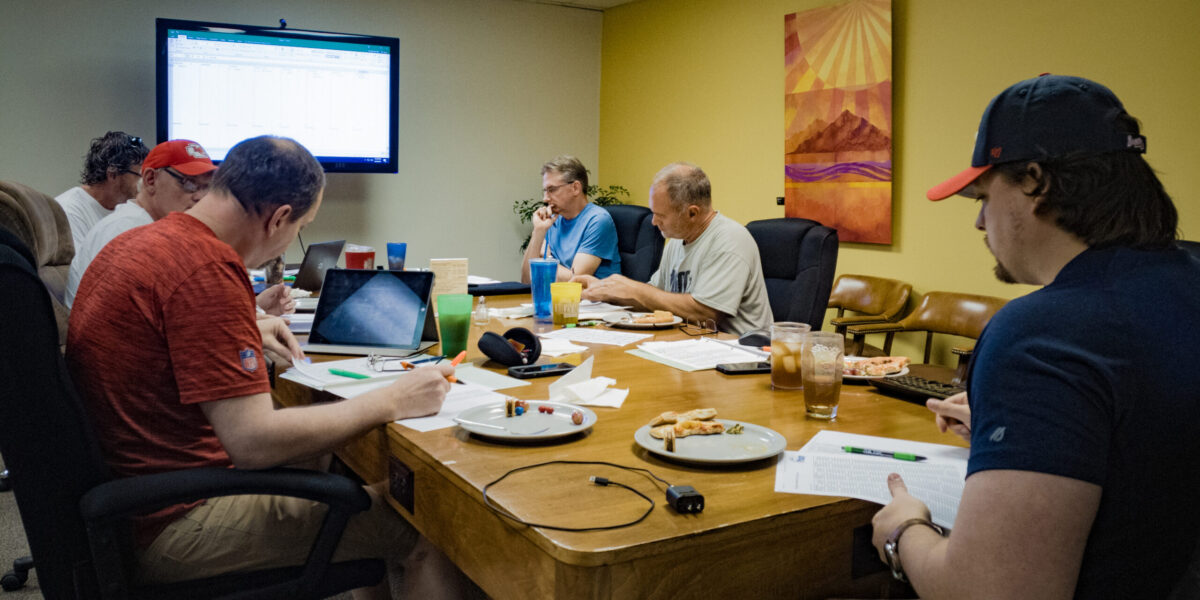NEWTON, Kansas (Mennonite Mission Network) — Squig has been playing fantasy football for 26 years, and this season, he’s sharing his winning draft strategy. "Spend a third of your money on someone who will spend the whole year injured," he jokingly advised his draftmates, who were gathered around the table.
"Better go for it again this year," someone suggested in between bites of pizza. Larry Regier, the league’s commissioner, looked over the group’s stat sheet from last year, and needled Squig about the bargain players that had helped him win the championship last season. "What about when you got Deebo Samuels and Cooper Kupp for a total of $5?"
"Well," Squig smiled. "There was that."
Squig, whose real name is Kevin Goertzen — the nickname has followed him around since college — is part of a fantasy football league that has been teasing, joking and poring over NFL stats since 1996. The group, initially made up of friends who had met at Bethel College in North Newton, Kansas, expanded over 2 ½ decades to include new friends and a son of one of the Bethel alumni. While the men stay connected throughout the entire NFL season, they get together every Labor Day to draft their fantasy football players, chit chat over junk food, and get updated on the ministries and partnerships of Mennonite Mission Network, which the group has helped financially support for the past decade.

League members have been teasing, joking and poring over NFL player stats since 1996. Left to right: Dwight Mueller, Kevin Goertzen (Squig, pictured on monitor), Terry Pryce, Kevin Regier, Larry Regier, Alan Mueller. Photo by Travis Duerksen.
At the start of every season, each league participant — referred to as a team owner — contributes a nominal fee that goes into a winnings pot. Those winnings get split up at the end of the season between the top scoring team owners. Each person also contributes whatever amount they desire towards the league’s total donation to Mission Network. That figure — and how it compared to last year’s donation total — is revealed after the draft party.
"We’ve always enjoyed getting together," said Dwight Mueller, who has been part of the league since its inception, and has three season championship wins under his belt. "Knowing that our league helps support ministries around the world is a really nice bonus."
Mueller, a development representative for Mission Network, said that, while the donations initially started as a direct match for the money the group had been paying to rent out a space for the draft party, watching the total donations increase year-after-year soon brought out some competitive generosity from the group.
"When you see the total donation amount from the group, there’s definitely some excitement in topping the previous year’s total and seeing the generosity that the event has inspired," he said.
While the league’s season fee and donations are actual currency, the money they use for drafting their fantasy football teams is strictly imaginary. At the start of the draft party, each team owner begins with $100 of imaginary money to spend on their fantasy football team. Then, the auction starts. Each participant takes turns announcing a player — or NFL team defense — along with the price they’d pay to recruit them to their team. The rest of the group can then bid up the announced player or team, with the highest bidder claiming the player/team defense for their team.

Kevin Regier and Larry Regier check their player stat ‘cheat sheets’ during the league’s auction draft. Photo by Travis Duerksen.
When the group first started their fantasy football league, the entire event was recorded with pens, graph paper and dog-eared player stat magazines. Every Saturday night before a match-up, the two men set to play one another would talk on the phone to confirm team line-ups. Then, come Monday morning, everyone would look over game stats in the morning newspaper to see whose team came out on top.
Now, almost everything is hosted online, including Squig, who moved from central Kansas to Virginia in 2013. He now joins the group via video chat.
"It’s just really fun to hang out with these guys," he said. "I mean, I could find a fantasy football league around here [in Virginia] … but these are some of my best friends, and it’s a way to stay connected with them, even though I’m a long way away."
In addition to keeping up with the ministries that their league donations support, the group also has strong ties to Mission Network’s service programs. Two of the league members are Service Opportunities with Our Partners (SOOP) alumni. One served in Mennonite Voluntary Service (MVS). Two of the men have children who have participated in Mission Network service programs, as well.
"We’re all football nerds," said Mueller. "But there’s a lot more that keeps bringing us together year after year."
You don’t need a whole fantasy football league to support Mission Network. Simply visit MennoniteMission.net/GivingTuesday on Nov. 29th, and give, to help support our ministries and partners across the street and around the world.








